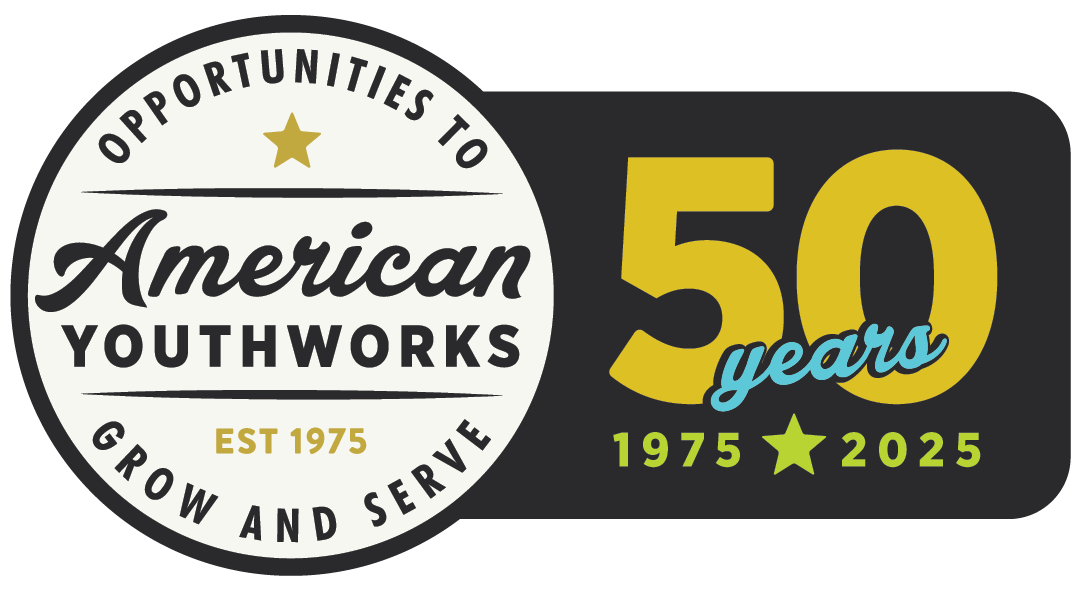“Hi everyone! My name is Megan Smith. I am the Individual Placements Coordinator with American Youthworks. What’s an individual placement? Allow me to explain!” Continue reading to learn about the experience Megan brings to the IP Coordinator role, what it means to host an IP, and more!
Can you tell us about yourself and your role at American YouthWorks?
What is an Individual Placement (IP)?
Where and how do IPs serve?
What does it mean to host an IP member?
What impact do IPs have on the communities they serve in?
Can you tell us about yourself and your role at American YouthWorks?
First, here’s a little background on me. After graduating with a degree in environmental policy, I served three AmeriCorps terms: one in Austin, Texas, one in Durango, Colorado, and one in San Antonio, Texas.
During my term in Austin my crew and I did some work locally, but we also traveled a lot! We rebuilt a fence at Lyndon B. Johnson National Historical Park, removed overgrown vegetation from colonial irrigation canals at San Antonio Missions National Historical Park, filled sandbags ahead of flooding in Flagstaff, Arizona, did trail maintenance in Ouachita National Forest in Arkansas, and cleared trees to restore pocket prairies in Kisatchie National Forest, Louisiana.
In my second term I served as a crew leader for Southwest Conservation Corps in Colorado. There my crew worked primarily on the Rough Canyon hike and dirt bike trail in San Juan National Forest. We repaired and installed drains, steps, tread and a stream crossing using local rocks and timber.
In my third term I served again as a crew leader, but this crew was special in that it was the first crew dedicated to working solely at San Antonio Missions National Historical Park! My crew’s main task was to manage the vegetation in and along the park’s 13 miles of active acequias (earthen irrigation canals built in the Spanish Colonial period) as not only are they historic structures, but they are also the oldest water right in Texas, and still bring water to a few private properties, and to fields managed by the San Antonio Food Bank.
After my third term came to a close, I went on to supervise three subsequent crews in San Antonio. I began my work supporting individual placements (IPs) in 2022, and transitioned fully into the role of IP Coordinator in the summer of 2023.
Since 2022 I have supported over 40 IPs in our program across Texas, Louisiana, Mississippi, and Arkansas. What makes this work so fulfilling for me is that it allows me to be at the nexus of several things I really enjoy: doing conservation work in the field, mentoring and supporting young adults in their professional development, building out the IP program to better serve IPs and our project partners, getting to travel to many of the neat places where my IPs work, and establishing partnerships with great organizations like the National Park Service and U.S. Forest Service who benefit from and enjoy supporting our IPs.
What is an Individual Placement (IP)?
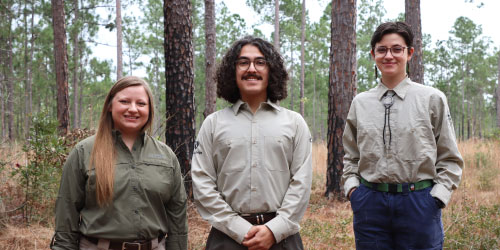
An IP is an AmeriCorps member who AYW places at one host site for the entirety of their AmeriCorps term of service. Most of our IPs serve, unsurprisingly, independently without any other AmeriCorps members, though some work in pairs or small teams of three. Our terms range from 3 to 11 months, during which members are expected to serve 40-42 hours per week; they receive a uniform and bi-weekly stipend payment and are expected to fill out timesheets, arrive at site reliably, operate tools safely and follow other basic performance standards. An IP can be any U.S. citizen or permanent resident alien, ages 18 to 28 (up to 35 for recent veterans), with at least a high school diploma or GED, and interested in working in conservation or land management.
An IP serves at their host site and reports to their host site supervisor on a daily basis. A host site can be a national park visitor center, a national forest district office, essentially any physical hub of work for the land management agency or organization hosting the IP. The host site supervisor is the person within the land management agency that directly supervises the IP. IPs also reports to me, the Individual Placements Coordinator, on a monthly basis to talk with me about the work they’ve accomplished, any professional development opportunities they’ve gotten to do, or any challenges they’re facing.
IPs serve with various team members of the land management agency/organization every day; it’s typical for IPs to feel like they have become part of the team by the time their terms are over, as they’re so deeply embedded in the daily operations of the host site.
Where and how do IPs serve?
IPs can serve in any of the states AYW operates in: Texas, Louisiana, Arkansas, and Oklahoma. The National Park Service and U.S. Forest Service have historically been our biggest partner organizations for hosting IPs, though we are able to partner with cities, counties, and nonprofits as well!
A difference between the typical conservation crew experience and the typical IP experience is that the scope and variety of service IPs can do is greater.
Most conservation crews at AYW do a mixture of trail building and maintenance, invasive vegetation management, and fuels work (managing vegetation to reduce fire risk or prepare for prescribed burns). While all IPs are expected to do some level of work outside during their terms, depending on their specific host site/position, they may work on a much greater variety of work that is tailored to the needs of that host site.
For instance, a Recreation/Visitor Center Technician IP working in the Sam Houston National Forest will help with weekly maintenance of camping and day use areas, water testing for harmful chemicals, fee collection, mowing and weed eating, hazard tree removal from roads, trails, and day use and camping areas, sign installation, road repair, outreach events in or near the forest, and interacting with visitors in person or over the phone at the front desk of the forest’s district office.
A Heritage IP working in Angelina-Sabine National Forests will help search for, prepare, and may even get to serve in archeological sites, will get to handle artifacts and may help catalogue them as they are found, and may assist with renaturalizing sites so they are not visible to visitors to the forest.
An Education IP working in Big Thicket National Preserve will work with the park’s interpretive team to develop curriculum for in-school presentations about the preserve’s ecology and present those programs to students across the local school district.
There are so many possibilities for IPs!
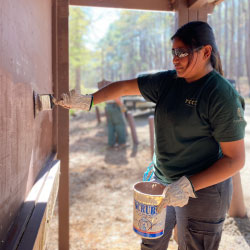
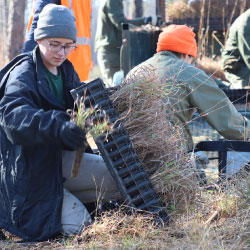
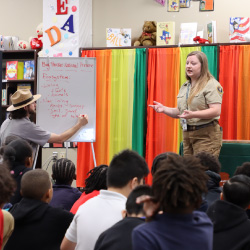
What does it mean to host an IP member?
For our host site supervisors, (HSS), hosting an individual placement is also a rewarding experience: they are welcoming a new team member and integrating them into their team or department’s daily operations. The HSS also gets to pull back the curtain on all the work that goes on behind the scenes to maintain our public lands, both the exciting and the tedious, the well-known roles like park ranger and the unsung heroes like forest biologists and archeologists. Host site supervisors are usually department and team leads who manage groups of people and are responsible for the completion of a number of high and low-priority projects at the host site, so the IP may often work with other members of the host site team. Host site supervisors and other team members train and familiarize the IP/s with all relevant tools and tasks, will oversee their daily work and accomplishments, and may periodically take them along on new or unique projects within and outside of their assigned department.
IPs who show exceptional dependability and initiative may be able to complete tasks and projects independently and with other AmeriCorps members and volunteers.
All this time at one location means that IPs have a unique opportunity to interface, build rapport, and network with a dedicated team of industry professionals. While AmeriCorps members on a crew may meet project partners at more locations, IPs get the chance to get to know the same group of individuals over a longer period of time. This has at times set IPs up to be hired onto their host site’s team directly after their terms end, sometimes before they end!
What impact do IPs have on the communities they serve in?
The work that individual placements do is impactful in multiple ways.
Their work is most beneficial to their host site and host site team. Most public lands are understaffed, and the IPs fill critical roles on the teams they’re assigned to. IPs have helped complete projects that had been incomplete for years, alleviating time, energy and manpower for more current needs.
When public lands are better cared for, the people who visit them have a better experience. Every national park and forest has a core group of local visitors who come throughout the year and feel deeply connected to these places; these folks can see and use improved amenities and resources in real time, and know that these places that they love are cared for. Non-local visitors have an enhanced experience whether visiting again or for the first time. IPs who interface with visitors provide additional opportunities for visitor learning and education about safety, resources, and amenities.
An IP’s impact can reach beyond their host park or forest’s borders. IPs have tabled at parades and community events, read to school children, dressed as Smokey the Bear in the host Texas and Louisiana summer, and delivered free in-school programming to students at school that lacked the funds for field trips. The archeological research and field work some IPs have completed has brought spiritual healing to Native peoples with ties to federal public lands and has contributed to strengthening relations between tribes and federal land management agencies. An IP focused on studying tree pathology (tree pests and diseases) provided information to concerned land owners near the forest about their own trees’ health.
IPs hired jointly by AYW and CorpsTHAT are part of the Deaf and Hard of Hearing Community — their presence and contributions throughout their terms help pave the way for a world where people of all abilities have greater access to land management and conservation careers.





